The Marianne Vos effect: 2012 Olympics-Worlds and the elevation of women's cycling
A 12-time world champion, a born leader, and a figurehead for progress and change
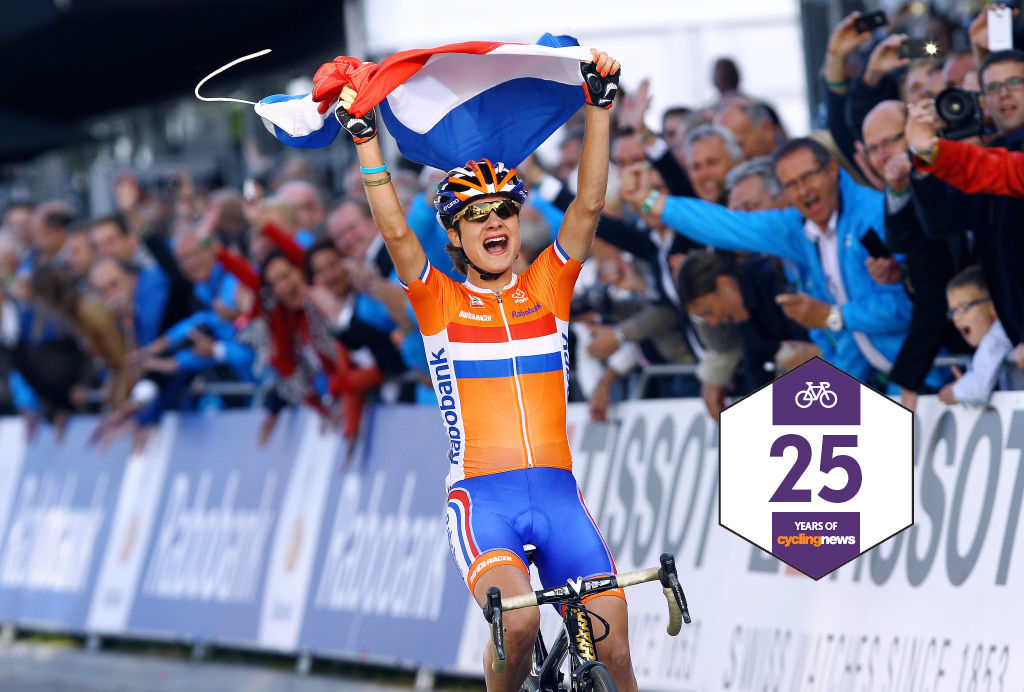
This year, Cyclingnews celebrates its 25th anniversary, and to mark such an important milestone, the editorial team will be publishing 25 pieces of work that look back at the sport over the last quarter of a century.
Marianne Vos has been the best rider in the world for well over a decade, with 12 World Championship titles across three disciplines – road, cyclo-cross and track – along with three gold medals in road and track racing at the Olympic Games.
Two titles stand out among her sea of victories: the road races at the London Olympic Games and Valkenburg World Championships, both in 2012 – not only because of her compelling racing style but also because they caught the mainstream media's attention and brought women's racing to the forefront.
These victories provided a platform on which to build the progression and professionalisation of women's racing that is occurring today, while also marking the beginning of Marianne Vos as a figurehead for the sport.
2012 Olympics: Vos vs Armitstead
An athlete doesn't become an icon overnight. It's a process that involves timing, great rivalries, iconic races and compelling storylines as much as hard work and victories. What made for a great story heading into the Olympic Games in London wasn't just that Vos was a favourite for the gold medal, but that the field was one of the strongest in the event's history.
Great Britain's team included the 24-year-old Lizzie Armitstead (now Deignan), who went into the race as a team leader, securing support from 2008 Olympic champion Nicole Cooke and former time trial world champion Emma Pooley. She also had the backing of her entire nation at a home Olympic Games, and so many of the mainstream storylines coming from London were about Armitstead and her chances of medalling for Great Britain.
There was also a great deal of anticipation for the British cycling team leading into their home Games because the nation's track team had been so successful in previous Olympics. The elite men's road team included Tour de France champion Bradley Wiggins, and there was an expectation on Mark Cavendish to medal in the men's road race.
Get The Leadout Newsletter
The latest race content, interviews, features, reviews and expert buying guides, direct to your inbox!
That narrative carried over into the women's road race, particularly on the Armitstead-versus-Vos rivalry, which helped cultivate hype and the major headlines across the mainstream media.
"Having a contest between two people that are near the top of their game creates a great race," says Sadhbh O'Shea, who volunteered as a Rider Liaison at the London Olympics before becoming News Editor at Cyclingnews. O'Shea is now a journalist for the BBC on the Isle of Man.
"Ultimately, the media blew up afterwards because it was such a good race. The battle between Vos and Armitstead drew an awful lot of attention to the race and to women's cycling."
The women's 140km circuit included the climb over Box Hill, and it started and finished on The Mall in London. It was pouring with rain, which added to the spectacle. The race was unpredictable, aggressive and thrilling, and the fact that it was Vos and Armitstead who ended up fighting it out for the gold medal added tension right to the very end.
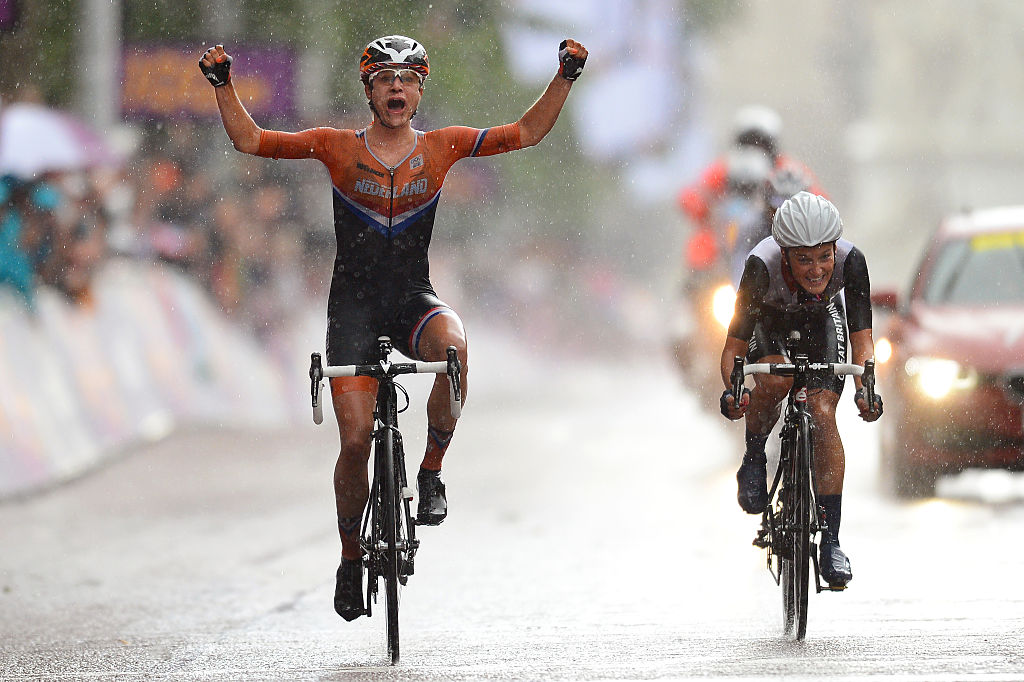
The dramatic finale included American Shelley Olds, who flatted out of the winning breakaway, while Vos narrowly beat Armitstead and Russia's Olga Zabelinskaya in a three-up sprint.
Laura Weislo, the deputy editor at Cyclingnews, travelled to London to cover the Olympic Games and remembers what it was like reporting on the women's race from The Mall.
"Olds wasn't the USA's first choice, but [Evelyn] Stevens and [Kristin] Armstrong crashed before Zabelinskaya launched the winning move," Weislo recalls. "After Olds punctured, the fans knew the first British medal of the home Olympic Games was coming, and they were totally manic on The Mall."
O'Shea acknowledges that live television coverage was an important factor in bringing attention to the women's race. The fact that it played out as a thrilling tactical battle helped elevate Vos and Armitstead, and women's cycling, to the mainstream public.
"The race was live from start to finish, and the Olympic Games is where the public gets to see live television coverage of events that they might not otherwise get to see," O'Shea says.
"Vos was already popular in the Netherlands, but the Olympic Games allowed the casual fan to see her do her thing, which they wouldn't ordinarily see. Unless you are an avid cycling fan, you may not have known who she was because women's road racing didn't get that much coverage, and this race showed her to the wider world."
2012 UCI Road World Championships in Valkenburg
The Dutch-British rivalry carried over into the UCI Road World Championships later that year. However, in a reversal of roles, all eyes were on Vos as the home favourite in Valkenburg, in the Netherlands.
Vos arrived as the hot-favourite having won the Olympic title earlier that summer, but she hadn't won a road world title since her victory as a first-year elite in Salzburg, Austria, in 2006. That helped add to the pre-race headlines because she had finished a maddening second place in the World Championships' previous five consecutive editions.
"I remember seeing the facial expressions on Marianne's face in the previous two World Championships when Giorgia Bronzini [Italy] won, and you could tell that she was getting more and more frustrated," O'Shea says.
"She was the favourite, and there were very few who could compare to her at that time. She had won the Olympics, she was on that trajectory, and she earned her role as the leader of the Dutch team."
The women's 129km road race was held on a 16.1km course designed around the Bemelerberg and then the Cauberg before a short run-in to the finish in Valkenburg. Cycling fans expected another showdown between Vos and Armitstead, but the latter pulled out of the race due to illness just days before the event.
Vos ended her silver medal streak by attacking on the final climb of the Cauberg to win by 10 seconds ahead of Australia's Rachel Neylan, while Italy's Elisa Longo Borghini came home a further eight seconds back in third.
Cyclingnews' Alasdair Fotheringham was reporting on the women's race and remembered a sea of fans celebrating as Vos crossed the line alone and with the world title.
“It was pretty electrifying. She attacked at the foot of the Cauberg climb and even in the press room nearly a couple of kilometres away, you could hear the roar of applause as she attacked and came up the hill past thousands of fans, cheering her on," Fotheringham said.
"They had moved the finish a little further along the ridge road at the top from where it had been in Amstel. If you look closely at videos, you can actually see the white lines painted on the road, and that meant that with a kilometre to go, she was so far clear, the last part of the race basically turned into a victory procession. She even, I think, grabbed a fan’s flag, which she waved before she crossed the line.
"After that, the men’s race was something of an anti-climax, even if with a star Belgian winner [Philippe Gilbert] and Belgium being so close, it was pretty much like another home triumph, too."
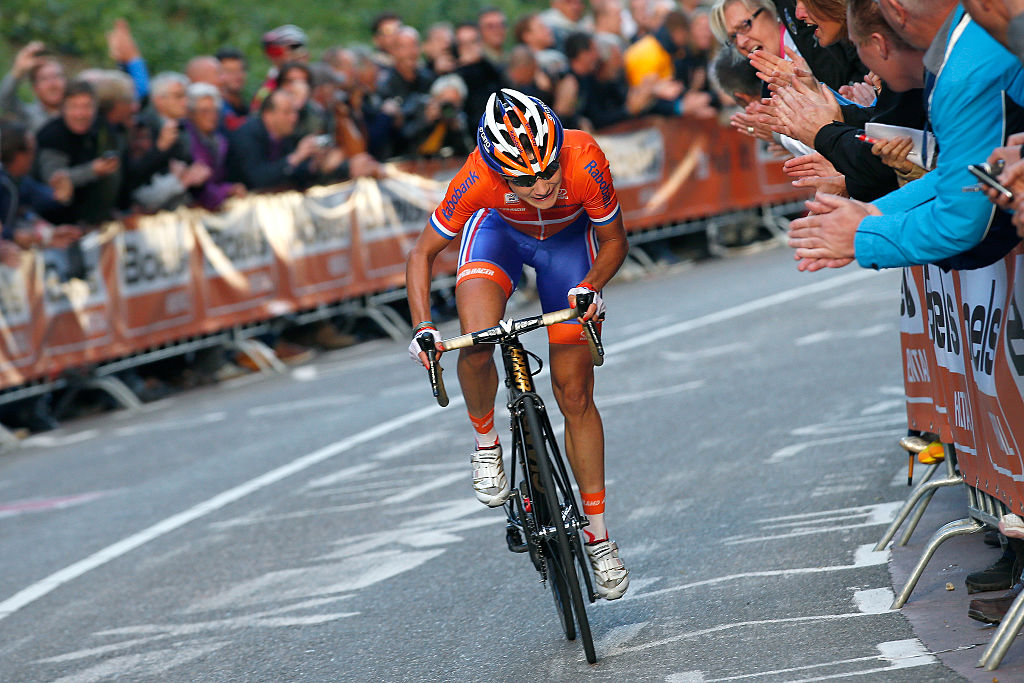
Barry Ryan, European Editor at Cyclingnews, was on-site at the Valkenburg Worlds, and remembers some of the sport's broader headlines in the days ahead of the elite women's race. However, Vos' anticipated victory on home roads was the highlight of the eight-day event.
"Questions about the UCI's handling of the Lance Armstrong case seemed to dominate the coverage that week, as the USADA Reasoned Decision was due to be published, but Marianne Vos racing for a rainbow jersey at home certainly felt like the main event on the road, and the crowds – and noise – on the Cauberg that Saturday confirmed as much," Ryan says.
"The attendance at the British men's team's press conference probably illustrated the point. For some unknown reason, it coincided with the early laps of the women's race, but when [world champion] Mark Cavendish, [Tour de France winner] Bradley Wiggins, [Tour runner-up] Chris Froome and [2012 revelation] Jonathan Tiernan-Locke took their seats, only four journalists were waiting for them. The conference didn't last very long. Everybody knew that Vos was the headline act in Valkenburg."
Having secured the Olympic Games-World Championship double, Vos' popularity sky-rocketed. Along with women's cycling, she was thrust into the spotlight in both road racing and cyclo-cross; the cycling world could not get enough of watching Marianne Vos' dominant style of winning bike races.
"The Olympic Games and the World Championships are races where, even if you don't understand cycling, you know what they are," says O'Shea, who believes Vos became more of a household name after her victories in London and Valkenburg.
"Walking up and telling someone about the Tour of Flanders, the chances are that they probably won't know what that is, but if you say you've won the gold medal at the Olympics or about your world title, it transcends individual sport."
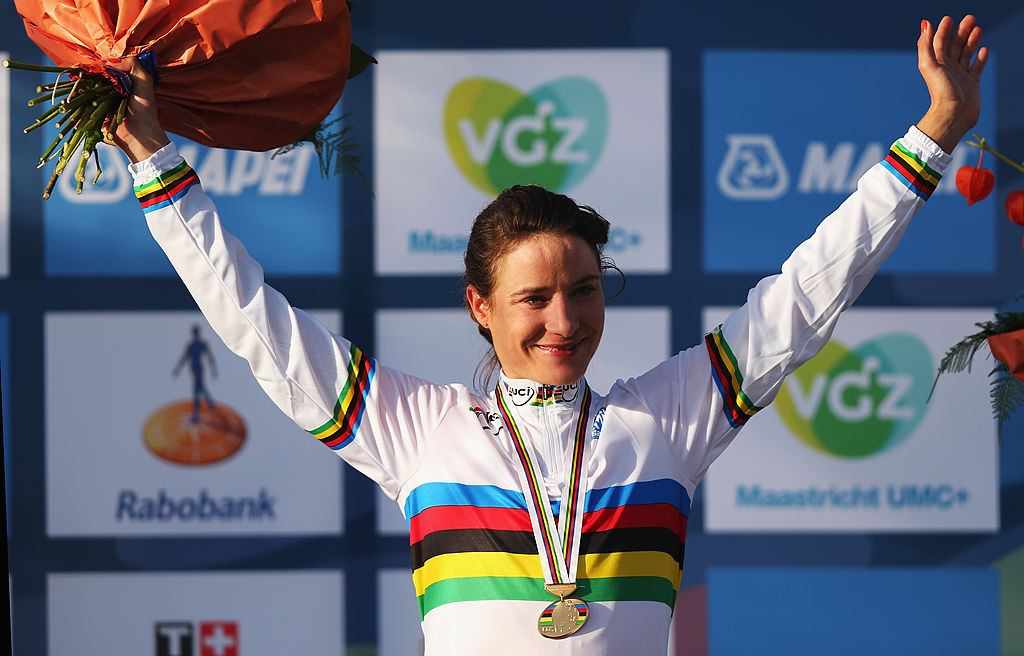
Becoming a figurehead
Vos has been described as one of the most iconic cyclists of all time. Since beginning her professional elite career nearly 16 years ago, her popularity has grown almost parallel to women's cycling's progression and popularity.
The UCI introduced the Women's WorldTour in 2016, which replaced the former World Cup, and then implemented reforms intended to professionalise the sport that included a new two-tier team system, minimum salary requirements, and social and health benefits for top-tier teams from 2020.
Part of that reform also included a mandatory 45 minutes of live television – in addition to the post-race highlight packages and broadcast reels – for all organisers wanting their event to be part of the Women's WorldTour.
Some organisers already offered live television in previous years. Still, the sport's governing body mandated this to help raise the level of viewership and professionalism of the races and to meet the fast-growing demands of fans interested in watching top-tier women's cycling on live platforms.
"Vos' persona, and the hype around her, probably did bring people into the sport, which therefore made TV companies more inclined to broadcast it. Once you add a little bit of broadcast to it, it helps grow the hype even further. They almost come together as a package. Her performances helped plant some of the seeds, and then each one played off each other," says O'Shea.
The cycling calendar was shut down due to the COVID-19 coronavirus earlier this year, but it restarted with the late-season revised Women's WorldTour between August and November.
The world no longer had to wait to watch live pictures of world-class women's road racing every four years at the Olympic Games. Fans watched live broadcasts of Lizzie Deignan and Lizzy Banks duking it out for the victory at the GP de Plouay, Deignan and Vos sprinting for the win at La Course, and Anna van der Breggen securing a history-making sixth consecutive title on the Mur de Huy at La Flèche Wallonne.
Vos has always been a champion of the sport, and not for her performances alone. She's a natural leader who guides, inspires and commands respect by setting the highest professional standards. She's an active player and often a spokesperson in women's cycling, and uses her status to contribute to the sport's overall growth and professionalisation.
"Vos has always been aggressive in her racing. She can read the race well, and she knows when to make the moves," O'Shea says. "She's also an eloquent and nice person as well, and although she is confident, she never seems arrogant or above her colleagues. She's very welcoming. She's done quite a lot and always speaks up about women's cycling. She wants to improve the sport, not just for herself, but for others."
Vos has been elected as a member of the UCI Athletes' Commission and as the riders' representative on the UCI Road Commission. She's also one of eight members of The Cyclists' Alliance Rider Council – an association for professional women riders.
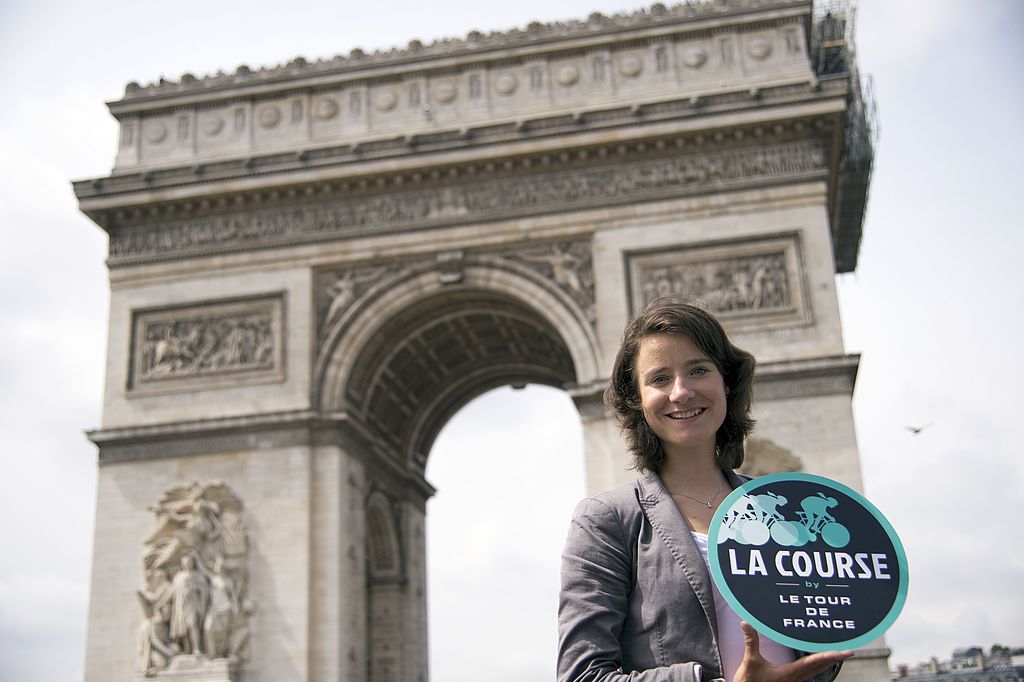
Vos was one of four women, alongside Kathryn Bertine, Emma Pooley and Chrissie Wellington, who formed Le Tour Entier, and set up a successful petition sent to the Amaury Sport Organisation (ASO) and Christian Prudhomme calling for a women's Tour de France. With 97,307 signatures, La Course by Le Tour de France was born in 2014. Vos won the inaugural edition on the Champs-Elysées in Paris and then won again in 2019 in Pau.
ASO has not lived up to its promise to increase the event to a multi-day women's Tour de France yet, but the race has been a showstopper on the Women's WorldTour for the last seven years.
"What I admire most about Marianne Vos is her humble, approachable nature, combined with her stalwart determination to make cycling a better sport for women," recalls Bertine, who is an advocate for equality in cycling and a documentary filmmaker of 'Half The Road'.
"In 2008, I raced in the peloton with Vos at the UCI Vuelta El Salvador, and watched as she domestiqued for her teammates. Vos' Beijing Olympic berth was already secured, so she was trying to help other Dutch women fulfill their qualifying dreams.
"In 2012, I reached out to Vos for an interview for Half the Road. Rather than give predictable answers, she wasn't afraid to call out the UCI and ASO to step up and do more for women's pro racing. When she said she wanted to race the Tour de France, I knew we could make something special happen. In 2013, Emma Pooley, Marianne Vos, Chrissie Wellington and I formed Le Tour Entier, and we petitioned ASO for equal inclusion of women at the Tour de France.
"Marianne played a huge part. When a World and Olympic champion speaks up, people listen. Marianne wasn't afraid to stand, speak and leverage her position to create change. ASO certainly listened, and together we created La Course by Le Tour de France in 2014. She won it that year, which was awesome in so many ways.
"Marianne is far too humble to say this about herself, so I'll proudly do it as her colleague, fan and friend. Vos is a selfless leader, team player and true champion on and off the bike. I hope all current and future champions of women's cycling will follow Vos' lead and use their victories and voices as instruments for change. We'll get to equal opportunity in cycling a lot faster when more athletes step up like Marianne Vos."

Kirsten Frattini is the Deputy Editor of Cyclingnews, overseeing the global racing content plan.
Kirsten has a background in Kinesiology and Health Science. She has been involved in cycling from the community and grassroots level to professional cycling's biggest races, reporting on the WorldTour, Spring Classics, Tours de France, World Championships and Olympic Games.
She began her sports journalism career with Cyclingnews as a North American Correspondent in 2006. In 2018, Kirsten became Women's Editor – overseeing the content strategy, race coverage and growth of women's professional cycling – before becoming Deputy Editor in 2023.